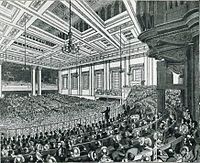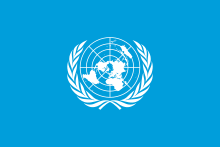An attempted application of ethical considerations to international politics.
A view opposed to realism in international relations, which seeks to understand international affairs by reference to interests wider than those of the particular national participants, and in terms of interests common to all.
Source:
Graham Evans and Jeffrey Newnham, The Dictionary of World Politics (Hemel Hempstead, 1990)
Origins

Meeting of the Anti-Corn Law League, 1846
In 19th-century Great Britain, there was a liberal internationalist strand of political thought epitomized by Richard Cobden and John Bright. Cobden and Bright were against the protectionist Corn Laws and in a speech at Covent Garden on September 28, 1843 Cobden outlined his utopian brand of internationalism:
Free Trade! What is it? Why, breaking down the barriers that separate nations; those barriers behind which nestle the feelings of pride, revenge, hatred and jealously, which every now and then burst their bounds and deluge whole countries with blood.[4]
Cobden believed that Free Trade would pacify the world by interdependence, an idea also expressed by Adam Smith in his The Wealth of Nations and common to many liberals of the time. A belief in the idea of the moral law and an inherent goodness in human nature also inspired their faith in internationalism.
Those liberal conceptions of internationalism were harshly criticized by socialists and radicals at the time, who pointed out the links between global economic competition and imperialism, and would identify this competition as being a root cause of world conflict. One of the first international organisations in the world was the International Workingmen’s Association, formed in London in 1864 by working class socialist and communist political activists (including Karl Marx). Referred to as the First International, the organization was dedicated to the advancement of working class political interests across national boundaries, and was in direct ideological opposition to strains of liberal internationalism which advocated free trade and capitalism as means of achieving world peace and interdependence.

The flag of the United Nations, the world’s premier international organization and proponent of internationalism
Other international organizations included the Inter-Parliamentary Union, established in 1889 by Frédéric Passy from France and William Randal Cremer from the United Kingdom, and the League of Nations, which was formed after World War I. The former was envisioned as a permanent forum for political multilateral negotiations, while the latter was an attempt to solve the world’s security problems through international arbitration and dialogue.

Ramsay MacDonald, a political spokesman for internationalism
J. A. Hobson, a Gladstonian liberal who became a socialist after the Great War, anticipated in his book Imperialism (1902) the growth of international courts and congresses which would hopefully settle international disputes between nations in a peaceful way. Sir Norman Angell in his work The Great Illusion (1910) claimed that the world was united by trade, finance, industry and communications and that therefore nationalism was an anachronism and that war would not profit anyone involved but would only result in destruction.
Lord Lothian was an internationalist and an imperialist who in December 1914 looked forward to “the voluntary federation of the free civilised nations which will eventually exorcise the spectre of competitive armaments and give lasting peace to mankind.”[5]
In September 1915, he thought the British Empire was “the perfect example of the eventual world Commonwealth.”[6]
Internationalism expressed itself in Britain through the endorsement of the League of Nations by such people as Gilbert Murray. The Liberal Party and the Labour Party had prominent internationalist members, like the Labour Prime Minister Ramsay MacDonald who believed that ‘our true nationality is mankind’[7]
Socialism
Internationalism is an important component of socialist political theory,[8][9] based on the principle that working-class people of all countries must unite across national boundaries and actively oppose nationalism and war in order to overthrow capitalism[10] (see entry on proletarian internationalism). In this sense, the socialist understanding of internationalism is closely related to the concept of international solidarity.
Socialist thinkers such as Karl Marx, Friedrich Engels, and Vladimir Lenin argue that economic class, rather than (or interrelated with) nationality, race, or culture, is the main force which divides people in society, and that nationalist ideology is a propaganda tool of a society’s dominant economic class. From this perspective, it is in the ruling class’ interest to promote nationalism in order to hide the inherent class conflicts at play within a given society (such as the exploitation of workers by capitalists for profit). Therefore, socialists see nationalism as a form of ideological control arising from a society’s given mode of economic production (see dominant ideology).
Since the 19th century, socialist political organizations and radical trade unions such as the Industrial Workers of the World have promoted internationalist ideologies and sought to organize workers across national boundaries to achieve improvements in the conditions of labor and advance various forms of industrial democracy. The First, Second, Third, and Fourth Internationals were socialist political groupings which sought to advance worker’s revolution across the globe and achieve international socialism (see world revolution).
Socialist internationalism is anti-imperialist, and therefore supports the liberation of peoples from all forms of colonialism and foreign domination, and the right of nations to self-determination. Therefore, socialists have often aligned themselves politically with anti-colonial independence movements, and actively opposed the exploitation of one country by another.[11]
Since war is understood in socialist theory to be a general product of the laws of economic competition inherent to capitalism (i.e., competition between capitalists and their respective national governments for natural resources and economic dominance), liberal ideologies which promote international capitalism and “free trade”, even if they sometimes speak in positive terms of international cooperation, are, from the socialist standpoint, rooted in the very economic forces which drive world conflict. In socialist theory, world peace can only come once economic competition has been ended and class divisions within society have ceased to exist. This idea was expressed in 1848 by Karl Marx and Friedrich Engels in The Communist Manifesto:
In proportion as the exploitation of one individual by another will also be put an end to, the exploitation of one nation by another will also be put an end to. In proportion as the antagonism between classes within the nation vanishes, the hostility of one nation to another will come to an end.[12]
The idea was reiterated later by Lenin and advanced as the official policy of the Bolshevik party during World War I:
Socialists have always condemned war between nations as barbarous and brutal. But our attitude towards war is fundamentally different from that of the bourgeois pacifists (supporters and advocates of peace) and of the Anarchists. We differ from the former in that we understand the inevitable connection between wars and the class struggle within the country; we understand that war cannot be abolished unless classes are abolished and Socialism is created.[13]
International Workingmen’s Association

Karl Marx was a prominent member of the First International, who drafted many of their pamphlets and statements
The International Workingmen’s Association, or First International, was an organization founded in 1864, composed of various working class radicals and trade unionists who promoted an ideology of internationalist socialism and anti-imperialism. Figures such as Karl Marx and anarchist revolutionary Mikhail Bakunin would play prominent roles in the First International. The Inaugural Address of the First International, written by Marx in October 1864 and distributed as a pamphlet, contained calls for international cooperation between working people, and condemnations of the imperialist policies of national aggression undertaken by the governments of Europe:
If the emancipation of the working classes requires their fraternal concurrence, how are they to fulfill that great mission with a foreign policy in pursuit of criminal designs, playing upon national prejudices, and squandering in piratical wars the people’s blood and treasure?[14]
By the mid-1870s, splits within the International over tactical and ideological questions would lead to the organization’s demise and pave the way for the formation of the Second International in 1889. One faction, with Marx as the figurehead, argued that workers and radicals must work within parliaments in order to win political supremacy and create a worker’s government. The other major faction were the anarchists, led by Bakunin, who saw all state institutions as inherently oppressive, and thus opposed any parliamentary activity and believed that workers action should be aimed at the total destruction of the state.
Socialist International
The Socialist International, known as the Second International, was founded in 1889 after the disintegration of the International Workingmen’s Association. Unlike the First International, it was a federation of socialist political parties from various countries, including both reformist and revolutionary groupings. The parties of the Second International were the first socialist parties to win mass support among the working class and have representatives elected to parliaments. These parties, such as the German Social-Democratic Labor Party, were the first socialist parties in history to emerge as serious political players on the parliamentary stage, often gaining millions of members.
Ostensibly committed to peace and anti-imperialism, the International Socialist Congress held its final meeting in Basel, Switzerland in 1912, in anticipation of the outbreak of World War I. The manifesto adopted at the Congress outlined the Second International’s opposition to the war and its commitment to a speedy and peaceful resolution:
If a war threatens to break out, it is the duty of the working classes and their parliamentary representatives in the countries involved supported by the coordinating activity of the International Socialist Bureau to exert every effort in order to prevent the outbreak of war by the means they consider most effective, which naturally vary according to the sharpening of the class struggle and the sharpening of the general political situation. In case war should break out anyway it is their duty to intervene in favor of its speedy termination and with all their powers to utilize the economic and political crisis created by the war to arouse the people and thereby to hasten the downfall of capitalist class rule.[15]
Despite this, when the war began in 1914, the majority of the Socialist parties of the International turned on each other and sided with their respective governments in the war effort, betraying their internationalist values and leading to the dissolution of the Second International. This betrayal led the few anti-war delegates left within the Second International to organize the International Socialist Conference at Zimmerwald, Switzerland in 1915. Known as the Zimmerwald Conference, its purpose was to formulate a platform of opposition to the war. The conference was unable to reach agreement on all points, but ultimately was able to publish the Zimmerwald Manifesto, which was drafted by Leon Trotsky. The most left-wing and stringently internationalist delegates at the conference were organized around Lenin and the Russian Social Democrats, and known as the Zimmerwald Left. They bitterly condemned the war and what they described as the hypocritical “social-chauvinists” of the Second International, who so quickly abandoned their internationalist principles and refused to oppose the war. The Zimmerwald Left resolutions urged all socialists who were committed to the internationalist principles of socialism to struggle against the war and commit to international workers’ revolution.[16]
The perceived betrayal of the social-democrats and the organization of the Zimmerwald Left would ultimately set the stage for the emergence of the world’s first modern communist parties and the formation of the Third International in 1919

Thanks for the sensible critique. Me and my neighbor were just preparing to do some research about this. We got a grab a book from our local library but I think I learned more from this post. I’m very glad to see such great info being shared freely out there.
Excellent blog you have got here.. ItÃs hard to find high quality writing like yours these days. I seriously appreciate individuals like you! Take care!!
I truly enjoy reading through on this site, it holds wonderful content.